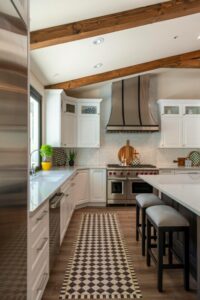Types of Countertops
Granite Countertops
Granite countertops are popular due to their beautiful, unique appearance and durability.
Pros and Cons
Granite is tough against scratches and can withstand heat well. However, it is porous, so sealing is necessary to prevent stains.
Maintenance and Care
Seal granite annually. Clean spills immediately to prevent staining. Use a gentle cleaner and avoid abrasive tools to maintain its shine.
Quartz Countertops
Quartz offers flexibility with its wide range of colors and patterns available.
Pros and Cons
Quartz resists stains better than granite but isn’t as heat-resistant. It also doesn’t need sealing like natural stones do.
Maintenance and Care
Clean quartz counters daily using mild soap mixed with water. Avoid harsh chemicals and use trivets or pads under hot items to prevent damage.
Laminate Countertops
Laminate countertops are a budget-friendly option that comes in many styles and colors.
Pros and Cons
Laminate is affordable and easy to install. However, it can be prone to scratches and burns and may not be as durable as natural stone options.
Maintenance and Care
Clean with a mild detergent and water. Avoid cutting directly on the surface and use trivets for hot pots.
Marble Countertops
Marble countertops are known for their elegant appearance and luxurious feel.
Pros and Cons
Marble is heat-resistant and adds a high-end look to any kitchen. However, it is prone to staining and scratching.
Maintenance and Care
Seal marble regularly to protect against stains. Clean with a pH-neutral cleaner and avoid acidic substances.
Concrete Countertops
Concrete countertops offer a modern, industrial look and can be customized with various colors and finishes.
Pros and Cons
Concrete is durable and heat-resistant but can crack and is prone to staining without proper sealing.
Maintenance and Care
Seal concrete surfaces regularly and clean with a mild soap. Repair cracks as needed to maintain its appearance.
Factors to Consider When Choosing Countertops
When choosing a countertop material, consider factors such as:
- Budget: Determine how much you can spend on materials and installation.
- Durability: Choose a material that can withstand your kitchen activities.
- Aesthetic: Select a countertop that complements your kitchen design.
- Maintenance: Understand the care required for each material to ensure it fits your lifestyle.
Installation Process of Countertops
Preparation
Prepare the area by removing old countertops and ensuring cabinets are level and secure.
Measuring and Cutting
Take accurate measurements and cut the countertop material to fit the space. Precision is crucial to avoid gaps and ensure a seamless fit.
Installation
Secure the countertop onto cabinets or base structures using adhesive and screws. Ensure it is level and properly aligned.
Finishing Touches
Apply caulk or sealant where needed to protect against moisture. Install backsplashes or edge treatments to complete the look.
Common Problems & Solutions With Countertops
Discoloration
Discoloration can occur from staining or prolonged sun exposure. Use sealants and UV-protective coatings to prevent this.
Cracks and Chips
Heavy impacts can cause cracks or chips, especially on edges. Repair kits are available for minor damages, but professional help may be needed for larger repairs.
Heat Damage
Placing hot items directly on the countertop can cause damage. Always use trivets or heat pads to protect the surface.
Eco-Friendly Countertop Options
Recycled Glass
Recycled glass countertops are made from crushed glass and resin, offering a sustainable and stylish option.
Bamboo
Bamboo countertops are renewable and biodegradable, making them an excellent eco-friendly choice.
Reclaimed Wood
Using reclaimed wood for countertops repurposes old materials and adds a rustic charm to your kitchen.
Conclusion: Making the Right Choice for Your Home
Choosing the right countertop material involves balancing aesthetics, durability, budget, and maintenance needs. Consider your kitchen’s usage patterns and personal preferences to make an informed decision that enhances your space both functionally and visually.
FAQs
- What is the most durable countertop?
- Quartz and granite are considered among the most durable countertop materials.
- How often should I seal my granite countertop?
- Typically, sealing once a year is sufficient to maintain protection against stains.
- Are eco-friendly countertops expensive?
- Costs vary depending on the type of material, but some eco-friendly options can be comparable to conventional ones. Recycled glass and bamboo can offer budget-friendly and sustainable choices.
Contents

[…] should not compromise the functionality of the kitchen. Balancing style with practicality ensures the remodel meets your daily […]